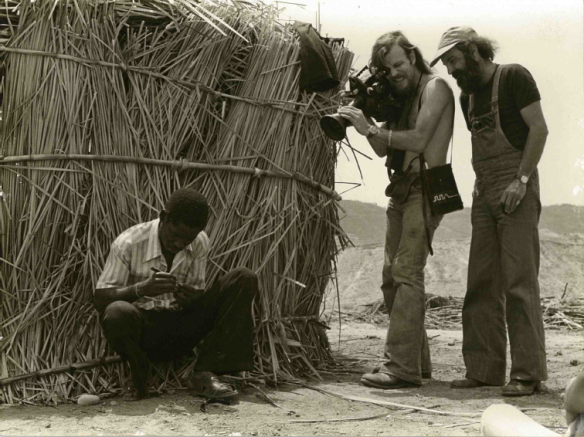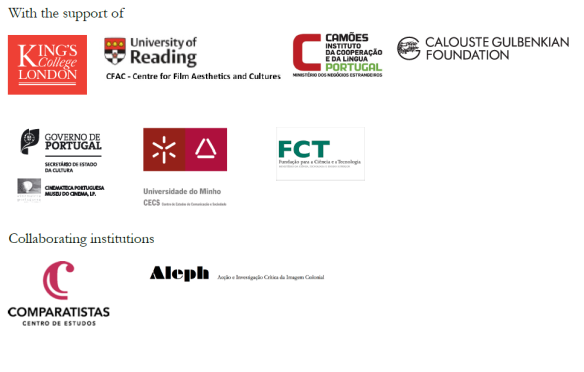International Conference
LIBERATION STRUGGLES, THE ‘FALLING OF THE EMPIRE’
AND THE BIRTH [THROUGH IMAGES]
OF AFRICAN NATIONS
Centre for Film Aesthetics and Cultures, University of Reading, Reading
27th January 2016
FINAL PROGRAMME

© Rute Magalhães / Luhuna Carvalho – Ruy Duarte de Carvalho e Beto Moura Pires na rodagem de Ofícios
Attendance is free but booking is required. To register, please email cfac@reading.ac.uk
http://www.reading.ac.uk/cfac/events/cfac-forthcomingevents.aspx
…
The fortieth anniversary of Portuguese decolonisation of Africa has acted as a catalyst in
discussing how Portugal ‘imagined’ colonial politics through moving images and how
these propagandist portrayals began to be questioned by the Portuguese ‘Novo Cinema’.
This can be seen in works that were censured and prohibited. Portuguese colonial
cinematographic representations were later challenged by films made in the context of
the liberation movements and by images that emerged out of the national
cinematographic projection (Frodon) of the new Portuguese-speaking African countries.
This conference intends to go some way in highlighting common aspects in the
emergence of cinema in Angola, Mozambique and Guinea-Bissau, which have all been
studied individually. In addition, it will provide a reflection on the roots of the
emergence of the ‘New Cinema’ from the militancy that uses film as a means of changing
society and focussing on the birth [in images] of new nations, being projected by the
programs of the Marxist parties that assumed power. The aim of the conference is also
to analyse how, through ‘Third Cinema’, the ‘Cinema Novo’ of Brazil and Cuban
Cinema, more specifically, in addition to the authors of the French ‘Rive Gauche da
Nouvelle Vague’, all played a role in questioning and rupturing the colonial
representations of the Portuguese dictatorship and, most of all, in the formation of the
projects and cinematographic archives of emerging African nations.
This conference also intends to question, apart from the reasoning of nationalist
propaganda, how did these new countries tell the story of their own history through film
and cinema (Godard/Ishaghpour)? Finally, it will be discussed how, given the ‘urgency
of the present’, the redemption of the past (Benjamin) is realised through a ‘cinema of
resistance’ (Deleuze), such as that of Pedro Costa, and by other moving images artistic
practises?
27th January 2016- Event schedule
10h-10h45 Studio Space, Minghella Building room 102
Maria do Carmo Piçarra (Lisboa/Minho/Reading) – Colonial reflections: Aleph as an
action-research platform to criticize colonial imaginaries
…
11h00-13h00 Studio Space, Minghella Building room 102
Panel I (De)constructing the projection of African nations through cinema
Chair: Alexandre Figueiroa (Recife)
Paulo Cunha (Coimbra) – Cinephilia and film culture in the “Portuguese Africa”: film
societies and amateur film
Raquel Schefer (Paris) –Mueda, Memory and Massacre by Ruy Guerra and the cultural forms
of the Mueda Plateau
Catarina Laranjeiro (Coimbra) – In the past the future was better
…
13h00-14h30 Lunch break
…
14h30- 16h30 Studio Space, Minghella Building room 102
Panel II Memory and gazes upon the “colonial archive”
Chair: Tiago de Luca (Liverpool)
Lúcia Nagib (Reading) – Colonialism as atmosphere in Tabu and The murmuring coast
Nuno Barradas Jorge (Nottingham) – To die a thousand deaths: historical memory and
the representation of personal narratives in the cinema of Pedro Costa
Teresa Castro (Paris) – The afterwardness of the colonial image: artists-researchers and
the Portuguese colonial archive
…
16h30-17h30 – Studio Space, Minghella Building room 102
Presentation of Daniel Barroca’s work by Teresa Castro
Drawing and undrawing images and memories by Daniel Barroca
…
18h00-20h30 Cinema, Minghella Building G4
Presentation by Nuno Barradas Jorge
Cavalo dinheiro (Horse money, Pedro Costa, 2015)
Projection and debate with the Portuguese Film Archive – Museum of Cinema director,
José Manuel Costa, and the director of CFAC, Lúcia Nagib.

Chair:
Maria do Carmo Piçarra (carmoramos@gmail.com)
Organising committee
- Lúcia Nagib, director of the Centre for Film Aesthetics and Cultures, University of Reading
- João Paulo Silvestre, Camões Centre for Portuguese Language and Culture, King’s College London
- Rosa Cabecinhas, Head of the PhD Program in Cultural Studies (University of Minho and University of Aveiro) and Associate Professor at the Social Sciences Institute University of Minho
- Maria do Carmo Piçarra, postdoctoral researcher, Centre for Film Aesthetics and Cultures, University of Reading / Communication and Society Research Centre, University of Minho / CEC – FLUL University of Lisbon
- Abdoolkarim Vakil, Department of Spanish, Portuguese and Latin American Studies & Department of History, King’s College London
- José da Costa Ramos, Professor, ISCTE – University Institut of Lisbon
Specialists and invited artists
- Ana Balona de Oliveira, postdoctoral researcher, CEC – FLUL / University of Lisbon / Institute for Art History of the New University of Lisbon
- Catarina Laranjeiro, filmmaker and doctoral researcher, CES – University of Coimbra
- Daniel Barroca, artist
- Filipa César, artist
- José Manuel Costa, director of Cinemateca Portuguesa – Museu do Cinema
- Lee Grieveson, director of the Graduate Programme in Film Studies at University College London and co-principal investigator of ‘Colonial Cinema: Moving Images of the British Empire’
- Maria-Benedita Basto, professor, Université Sorbonne Nouvelle – Paris 8
- Nuno Barradas Jorge, doctoral researcher, University of Nottingham
- Paulo Cunha, professor and researcher, CEISXX – Universidade de Coimbra
- Pedro Costa, filmmaker
- Raquel Schefer, artist and professor, Université Sorbonne Nouvelle – Paris 3
- Robert Stock, professor, University of Konstanz
- Ros Gray, theorist and lecturer in Fine Art (Critical Studies), Goldsmiths College, University of London
- Teresa Castro, art historian and professor, Université Sorbonne Nouvelle – Paris 3
Production Support
Sílvia Macedo

